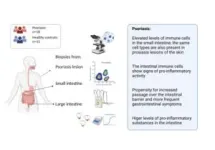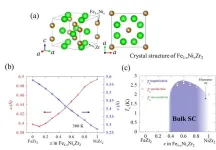(Press-News.org) People with the skin condition psoriasis often have invisible inflammation in the small intestine with an increased propensity for ‘leaky gut’, according to new research at Uppsala University. These changes in the gut could explain why psoriasis sufferers often have gastrointestinal problems and are more prone to developing Crohn’s disease. The study is published in Biochimica et Biophysica Acta (BBA) – Molecular Basis of Disease.
Psoriasis is a hereditary, chronic skin condition that can also result in inflammation of the joints. In Sweden, almost 300,000 people live with some form of the condition. Chronic inflammatory bowel diseases (IBD), especially Crohn’s disease, are more common in patients with psoriasis than in the rest of the population.
“Previous research has also shown that people with psoriasis have more gastrointestinal problems than the general population. However we didn’t know much about why this is the case. With our study, we can now show that people with psoriasis often have invisible inflammation in their small intestines, with an increased risk of what’s called leaky gut,” says Maria Lampinen, researcher at Uppsala University.
Pro-inflammatory activity in the gut
The study involved 18 patients with psoriasis and 15 healthy controls as subjects. None of the participants had been diagnosed with gastrointestinal diseases. Samples were taken from both their small and large bowel. The researchers then studied different types of immune cells in the mucous membrane.
“It turned out that psoriasis sufferers had higher numbers of certain types of immune cells in their small intestine, and the cells showed signs of pro-inflammatory activity. Interestingly, we found the same type of immune cells in skin flare-ups from psoriasis patients, suggesting that the inflammation of the skin may have an impact on the gut, or vice versa.
Increased propensity for leaky gut
Normally, the intestinal mucosa act as a protective barrier that also allows nutrients and water to pass through it. In some autoimmune diseases, the intestinal barrier may function poorly. This is called having a leaky gut, and leads to bacteria and harmful substances leaking through the intestinal barrier and causing inflammation. This can also cause more widespread inflammation when these substances are spread via the bloodstream.
Half of the psoriasis patients in the study had increased intestinal barrier permeability or leaky gut. These same patients also reported more gastrointestinal symptoms such as abdominal pain and bloating than patients with a normal intestinal barrier. They also had elevated levels of inflammatory substances in their intestines.
“Given that the psoriasis patients in our study had relatively mild skin disease and showed no visible intestinal inflammation in a gastroscopy, they had surprisingly clear changes in their small intestine compared to healthy controls. These changes could explain why psoriasis sufferers often have gastrointestinal problems, and an increased risk of developing Crohn’s disease.
Important research for these patients
The Psoriasisförbundet (the Swedish Psoriasis Association) member magazine published an article about this study. Following its publication, Maria Lampinen received many e-mails from people who recognised this phenomenon.
“They wanted to know more about the link between the gut and the skin because they recognised that symptoms from their gut and skin were often linked. So it feels like this research is needed and is important for the patients themselves. A greater understanding of gastrointestinal problems in psoriasis patients can help the healthcare system to pay more attention to the link between the gut and the skin in patients with psoriasis, and in the long term it could also lead to better treatment of these problems.
The study was funded by the Psoriasis Association’s managed funds and Hudfonden (the Skin Foundation), among others.
Facts:
The psoriasis patients were recruited from the Dermatology Clinic, Uppsala University Hospital and the Kaniken dermatology clinic in Uppsala. The member magazine of the Psoriasis Association also helped the researchers with patient recruitment. Healthy controls were recruited via advertisements as well as among healthy colleagues at Uppsala University Hospital.
END
Inflammation may explain stomach problems in psoriasis sufferers
2025-01-20
ELSE PRESS RELEASES FROM THIS DATE:
Guidance on animal-borne infections in the Canadian Arctic
2025-01-20
A new review on zoonotic infections — diseases transmitted by animals — in the Canadian Arctic provides timely guidance to clinicians as the region experiences heightened global interest as well as climate change, which threatens the region and increases risk of disease transmission. The review, published in CMAJ (Canadian Medical Association Journal) https://www.cmaj.ca/lookup/doi/10.1503/cmaj.240541, provides guidance on how to identify and manage seven zoonotic infections in people.
“Indigenous Peoples continue to be caretakers of ...
Fatty muscles raise the risk of serious heart disease regardless of overall body weight
2025-01-20
People with pockets of fat hidden inside their muscles are at a higher risk of dying or being hospitalised from a heart attack or heart failure, regardless of their body mass index, according to research published in the European Heart Journal [1] today (Monday).
This ‘intermuscular’ fat is highly prized in beef steaks for cooking. However, little is known about this type of body fat in humans, and its impact on health. This is the first study to comprehensively investigate the effects of fatty muscles on heart disease.
The new finding adds evidence that existing measures, such as body mass index or waist ...
HKU ecologists uncover significant ecological impact of hybrid grouper release through religious practices
2025-01-19
Ecologists from the School of Biological Sciences (SBS) and the Swire Institute of Marine Science (SWIMS) at The University of Hong Kong (HKU) have identified significant ecological risks associated with the release of hybrid groupers into Hong Kong’s coastal waters, a practice often linked to religious ‘mercy release’ rituals.
Their study highlights how the Tiger Grouper-Giant Grouper hybrid (TGGG), also known as the Sabah grouper, disrupts local marine ecosystems by exploiting unique ecological niches and potentially becoming a dominant predator. This research, the first ...
New register opens to crown Champion Trees across the U.S.
2025-01-18
The National Champion Tree Program (NCTP) announced its first Register of Champion Trees since 2021. The program moved from American Forests to the University of Tennessee School of Natural Resources in 2023 and has spent the past year working with state-level Champion Tree programs across the U.S. to update outdated records and verify the newly crowned champions.
“We are thrilled beyond measure to share the list of the largest documented trees in the United States,” Jaq Payne, NCTP director, said. “These trees are more than just numbers on a website. They're living, breathing members of our community. I hope this register encourages folks to start ...
A unified approach to health data exchange
2025-01-18
About The Article: This article outlines the ways in which the U.S. Department of Health and Human Services has worked to use electronic health record data to improve patient health, public health, and health care.
Corresponding Author: To contact the corresponding author, Robert M. Califf, MD, email commissioner@fda.hhs.gov.
To access the embargoed study: Visit our For The Media website at this link https://media.jamanetwork.com/
(doi:10.1001/jama.2025.0068)
Editor’s ...
New superconductor with hallmark of unconventional superconductivity discovered
2025-01-18
Tokyo, Japan – Researchers from Tokyo Metropolitan University have discovered a new superconducting material. They combined iron, nickel, and zirconium, to create a new transition metal zirconide with different ratios of iron to nickel. While both iron zirconide and nickel zirconide are not superconducting, the newly prepared mixtures are, exhibiting a “dome-shaped” phase diagram typical of so-called “unconventional superconductors,” a promising avenue for developing high temperature superconducting materials which can be more widely deployed in society.
Superconductors already play ...
Global HIV study finds that cardiovascular risk models underestimate for key populations
2025-01-18
Cardiovascular disease (CVD) is the leading cause of morbidity and mortality globally, posing a particularly significant threat to people with HIV (PWH). To address this, CVD prevention plans rely on prediction models like atherosclerotic cardiovascular disease (ASCVD) risk scores to estimate the risk of heart disease.
However, previous studies have called into question whether these commonly used prediction models perform well among people with HIV, and there remains a gap in understanding of what these scores mean for PWH in low- and middle-income countries (LMICs).
Researchers from Massachusetts General Hospital, a founding member of the Mass General Brigham ...
New study offers insights into how populations conform or go against the crowd
2025-01-17
Cultural traits — the information, beliefs, behaviors, customs, and practices that shape the character of a population — are influenced by conformity, the tendency to align with others, or anti-conformity, the choice to deliberately diverge. A new way to model this dynamic interplay could ultimately help explain societal phenomena like political polarization, cultural trends, and the spread of misinformation.
A study published in the Proceedings of the National Academy of Sciences outlines this novel approach. Presenting a mathematical model, SFI Complexity Postdoctoral Fellow Kaleda Denton with colleagues ...
Development of a high-performance AI device utilizing ion-controlled spin wave interference in magnetic materials
2025-01-17
A research team from NIMS and the Japan Fine Ceramics Center (JFCC) has developed a next-generation AI device—a hardware component for AI systems—that incorporates an iono-magnonic reservoir. This reservoir controls spin waves (collective excitations of electron spins in magnetic materials), ion dynamics and their interactions. The technology demonstrated significantly higher information processing performance than conventional physical reservoir computing devices, underscoring its potential to transform AI technologies.
As AI devices become increasingly sophisticated, ...
WashU researchers map individual brain dynamics
2025-01-17
By Shawn Ballard
The complexity of the human brain – 86 billion neurons strong with more than 100 trillion connections – enables abstract thinking, language acquisition, advanced reasoning and problem-solving, and the capacity for creativity and social interaction. Understanding how differences in brain signaling and dynamics produce unique cognition and behavior in individuals has long been a goal of neuroscience research, yet many phenomena remain unexplained.
A study from neuroscientists and ...






